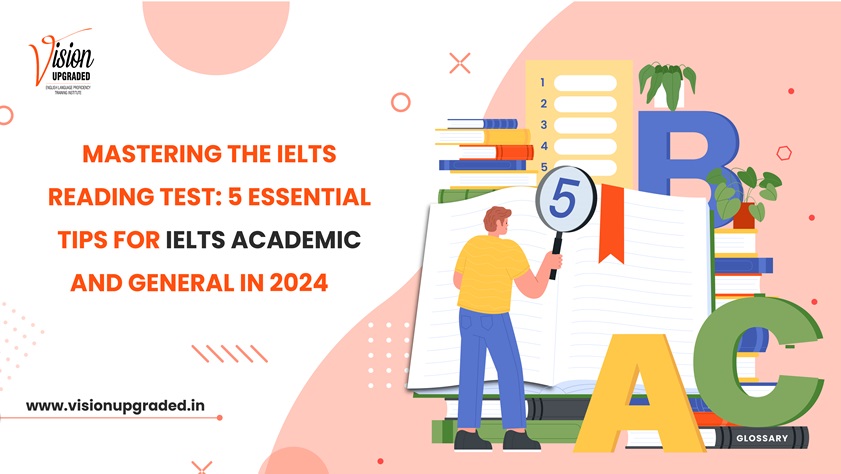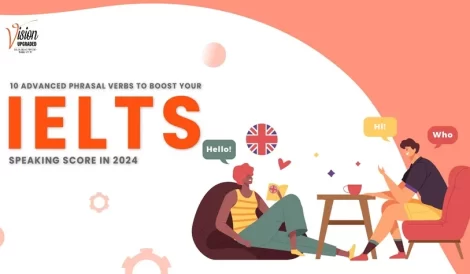Mastering the IELTS Reading Test: 5 Essential Tips for IELTS Academic and General in 2024
Whether you are preparing for the IELTS Academic or General exam, mastering the reading section is vital for achieving a high score. Reading is not only about understanding words on a page; it’s about extracting meaning, identifying key points, and using efficient strategies to answer questions correctly. The IELTS reading test evaluates a variety of skills that are essential for success in both academic and professional settings.
The IELTS Reading Test, regardless of whether it is Academic or General, comprises 40 questions to be answered in 60 minutes. The goal is to assess your ability to read and understand a range of texts from different genres and topics. These could range from descriptive essays and analytical reports to factual information found in newspapers and magazines. In both versions of the exam, you need to be ready for a diverse selection of texts and the questions that follow.
For anyone preparing at an IELTS centreMukerian, understanding and applying strategies to tackle this section of the test is crucial. This guide will offer five key tips that will improve your chances of succeeding in both the Academic and General IELTS exams.
1. Familiarize Yourself with the IELTS Reading Test Format
The first step toward achieving success in the IELTS Reading Test is to familiarize yourself with its format. This will give you a clear idea of what to expect and help reduce any anxiety you may have on test day. For both the Academic and General reading tests, the format is divided into three sections, each becoming progressively more difficult.
In the Academic test, you will be given three long texts, which are often excerpts from books, journals, magazines, and newspapers. These texts will require a thorough understanding of complex ideas and arguments. In contrast, the General test focuses on everyday life materials such as advertisements, workplace instructions, and general-interest articles.
Knowing the types of questions you’ll encounter is equally important. You might be asked to complete sentences, answer multiple-choice questions, label diagrams, or match headings to paragraphs. Preparing for all types of questions at an IELTS centreMukerianwill enhance your confidence and help you maximize your score. You will also become familiar with how much time to allocate to each question, ensuring that you finish the test within the allotted 60 minutes.
2. Improve Your Reading Speed
The IELTS reading section is not just a test of comprehension; it’s also a test of time management. To succeed, you need to be able to read quickly and accurately. One of the biggest challenges for many candidates is completing all 40 questions in just 60 minutes. This means that on average, you only have about 90 seconds per question. Therefore, improving your reading speed is crucial.
Improving your reading speed involves practising reading various types of texts in English and gradually increasing the speed at which you read. However, remember that speed alone isn’t enough. You must be able to read quickly while still comprehending the key points of the text.
You can practice improving your reading speed by using online resources, apps, and books. Regularly timed practice sessions with passages of similar difficulty to those found in the IELTS will also help you adjust to the pacing of the exam. An IELTS coaching centre in Mukerianwill guide you through timed reading practices that will help you learn how to balance speed with comprehension.
3. Practice Skimming and Scanning
Skimming and scanning are two essential techniques that will help you efficiently navigate through the reading test. Skimming involves quickly reading through a text to grasp its main ideas. Scanning, on the other hand, refers to searching through the text for specific information.
These skills will save you time during the test by allowing you to locate answers without having to read every word of the text. For instance, if a question asks you to identify a specific fact or figure, you can scan the text for numbers, dates, or keywords instead of reading every sentence.
4. Read Different Types of Texts
The IELTS reading test is designed to evaluate how well you can understand various types of texts, each with its own style and structure. In both the Academic and General exams, you may encounter texts that range from descriptive passages and factual reports to opinion pieces and analytical discussions. The texts might vary in tone, vocabulary, and subject matter, so it’s important to expose yourself to a wide variety of materials in your preparation.
To improve your reading comprehension and adaptability, regularly read different types of texts. This includes academic articles, essays, news reports, magazine features, advertisements, and more. Doing this will expose you to different writing styles, vocabularies, and ideas, which will help you handle the diverse range of texts that appear in the IELTS exam.
Teachers will guide you through challenging texts and help you identify effective strategies for answering questions based on different genres of writing.
5. Develop an Understanding of the Purpose of the Text
One important skill in the IELTS reading test is the ability to understand the purpose of the text. Knowing why a passage was written and what the author is trying to communicate will help you quickly identify the key points and themes. This is especially important for answering questions that ask for the main idea, the author’s attitude, or the purpose of a paragraph.
When reading a text, think about what the author is trying to achieve. Are they presenting an argument, explaining a process, describing an event, or providing a critical analysis? Understanding this will help you interpret the text more accurately and answer questions more effectively.
At an IELTS coaching centre in Mukerian, instructors will teach you how to approach texts strategically. They will help you understand how to analyze the structure, content, and purpose of a passage, so you can extract relevant information more easily.
Conclusion
Success in the IELTS Reading Test is about more than just knowing the answers; it’s about knowing how to approach the questions and manage your time effectively. By familiarizing yourself with the test format, improving your reading speed, practising skimming and scanning, exposing yourself to a variety of texts, and understanding the purpose of what you’re reading, you will be well on your way to achieving your desired score.
An IELTS centreMukerian can provide expert guidance and support, offering tailored advice, practice tests, and materials to help you hone your reading skills. With consistent practice and the right techniques, you can confidently tackle the IELTS Reading Test and take one step closer to achieving your academic or professional goals.




